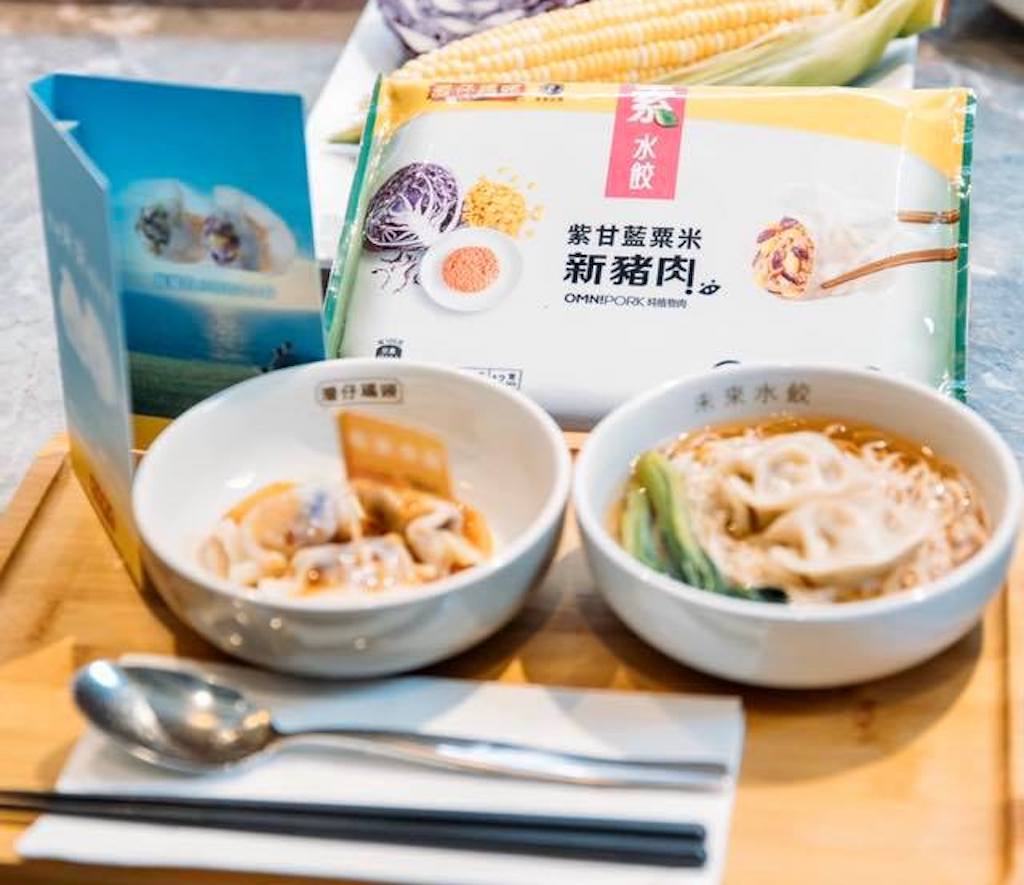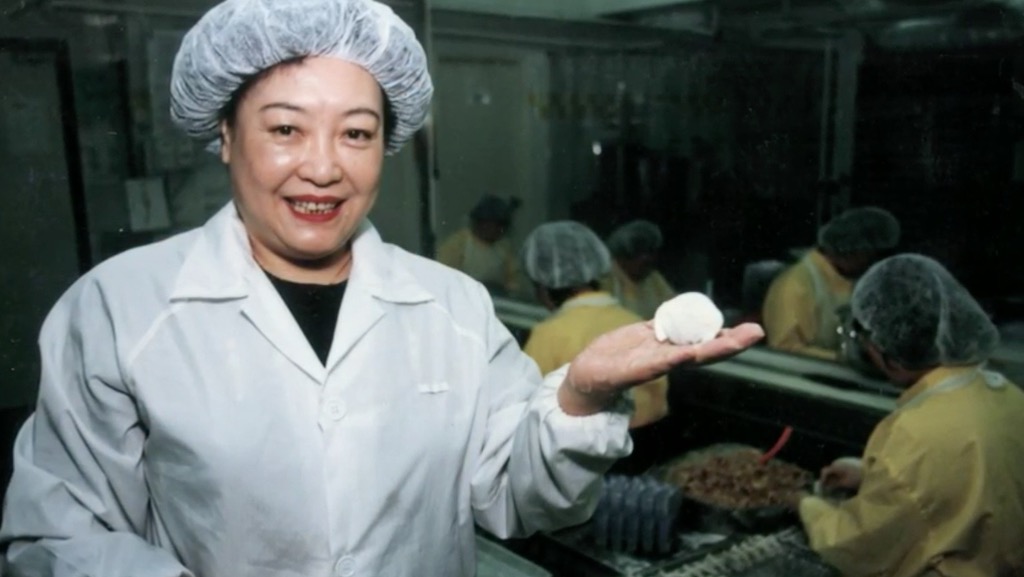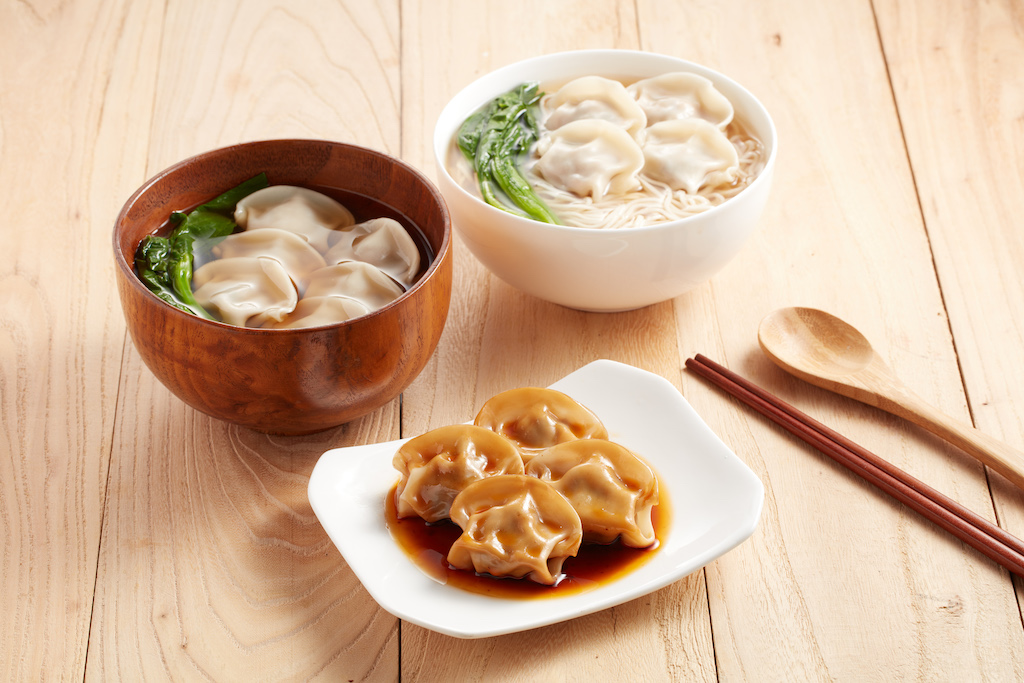6 Mins Read
For years, the quiet executive director of Hong Kong’s Green Monday has been fighting hard to grow the plant-based movement across Asia, but no victory has been quite as sweet as the launch of Wanchai Ferry’s new vegan-friendly Omnipork dumplings.
“You know I just had Wanchai Ferry’s Omnipork dumplings for lunch,” Jenny Ng tells me, over the phone on a quiet Monday afternoon. A bit of a coincidence, perhaps, as I had the same thing for lunch too.
Since Wanchai Ferry – one of the most recognisable frozen dumpling brands in Hong Kong – debuted its Omnipork dumplings earlier in May, the 100% plant-based dumplings sold for price parity with the non-vegan version across Hong Kong’s major supermarket chains has been a big hit.
It tastes, looks and even bites like the real deal, all without the need for a single animal life, thanks to the now world famous pork mince analogue Omnipork, developed and launched by Green Monday’s food tech arm OmniFoods in 2018.

For thousands of Chinese families, dumplings are the ultimate comfort food, a staple dish often enjoyed and shared together, so having a vegan-friendly alternative that can match the conventional version is a huge feat. But for Jenny, the meaning of having Omnipork Wanchai Ferry dumplings is a story of coming full circle.
“I was actually born in Wanchai,” she recalls. “I lived next to the Wanchai wet market, and I spent lots of time tagging along with my mum, following her to do her daily food shopping.”
It wasn’t that Ng enjoyed going to the wet market, it was just where the average Hong Konger did their daily fresh produce shopping. Most still do today, despite air-conditioned supermarket chains now rising in popularity, particularly amongst the younger generation.
“Funny thing is, I was quite afraid of wet markets,” Ng explains. “There was always a lot of slaughter going on and those butcher shops were frightening.”
But there was one thing that made each trip to the Wanchai wet market worthwhile. A certain dumpling store, set up in 1978 and run by Ms. Chong Kin-wo, or more affectionately as Chong 姑娘 (gu noeng), a term used fondly for ladies. Chong gu noeng sat in her stall in the Wanchai market and made dumplings by hand every day, alongside a few other ladies who helped her out.
It was her favourite destination. “I loved her dumplings,” she tells me enthusiastically. “My mum would call me the queen of dumplings at home – I could easily devour 15 dumplings in one meal!”

And it was only Chong gu noeng’s dumplings that made the cut for Ng. When her mother would sometimes purchase dumplings from another stall, she would ask for the ones made by the woman now known as the “Dumpling Queen” who founded the Wanchai Ferry stall that later became the iconic mass market brand seen on supermarket freezer shelves across Asia and acquired by Pillsbury in 1997 and then absorbed by food giant General Mills a few years later.
“I preferred hers. I could taste the difference! Even without the packaging, I just knew it wasn’t the dumplings made by Chong gu noeng.”
For Ng, there was nothing that quite beat Wanchai Ferry’s pork and watercress (sai yeung choi) or pork and pak choi dumplings. And so it was hugely personally rewarding that it was this very brand that Ng later ended up working alongside to bring vegan-friendly Omnipork dumplings to Hong Kong.
As the executive director of Green Monday, an influential plant-based platform led by the better-known founder and CEO David Yeung, Ng had a big part to play in bringing about Wanchai Ferry’s very first vegetable-based dumplings into reality as a part of the company’s mission to reduce meat consumption in the city and around the world.
Three years ago, the brand became curious about the plant-based market in Hong Kong and wanted to test whether Green Monday followers would be receptive to a new line of plant-based dumplings made with classic veggie ingredients such as mushrooms, black fungus and cabbage.
“To their surprise, it was much more popular than they thought. The sales proved it,” she told me, adding that it kickstarted an ongoing partnership between the two Green Monday and General Mills.
But in the midst of their work together in 2018, Green Monday took a huge leap forward and launched the enormously successful vegan pork mince substitute Omnipork, made from a proprietary blend of non-GMO soy, peas, rice and shiitake mushrooms.
The product looks, and more importantly cooks, almost exactly like conventional pork, without the hormones, cholesterol or environmental footprint. Hundreds of restaurants in Hong Kong and later across Asia began launching Omnipork dishes, from plant-based mapo tofu rice to spaghetti bolognese.
Kind Kitchen, Green Monday’s own vegan restaurant concept, started making handmade dumplings with Omnipork. Then, a lightbulb flashed for Ng.

“We had been talking to them about our own product and how suitable it was for use in dumplings,” she said. “I was so enthusiastic about it, we got the General Mills team to try our own Omnipork dumplings and they liked it and later pitched the idea to their R&D.”
“It took a lot of work, almost a whole year in the making. But I wanted to put two of my most loved, favourite things, together.” Omnipork would make it possible for Wanchai Ferry to recreate a plant-based version of her beloved dumpling fillings – pork and vegetables.
In May, when the Green Monday executive director saw the first ever pack of Omnipork dumplings, she almost couldn’t believe her eyes. “I was so touched,” she said, after a pause of reflection of the moment. “My mum was so surprised too. She said to me: ‘really?’ She was in disbelief!”
“I feel so grateful for the late Chong gu neong and her daughter for supporting the idea,” Ng added. “I was told they had been excited to see how the brand has embraced a new trend, a new generation and has evolved over the years.”
That’s exactly where her mission lies – to conserve the culture of traditional Cantonese foods whilst providing healthier and more sustainable options. Along with her entire team at Green Monday, she has been at the forefront of scaling up mass, affordable and accessible options across Asia, from collaborating with dumpling chain Bafang Yunji in Taiwan to their latest project with ALDI in mainland China to bring plant-based convenience meals to Shanghai.
When she started her journey, people raised questions about whether plant-based would really take off in the mass market in Hong Kong and globally. “It’s not been an easy road,” she tells me. “But I think we’ve opened up people’s eyes to believe and accept the fact that unhealthy and unsustainable products have less appeal. People want greener options.”
Now that the Green Monday executive director has tackled the iconic Chinese comfort dish, what’s going to her next target? She chuckles. “Certainly, instant noodles one day.”
Lead image courtesy of Green Monday / Jenny Ng.




